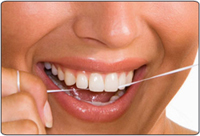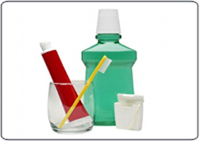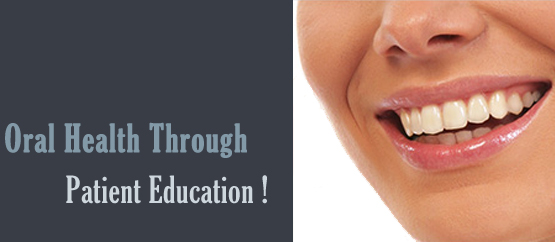|
 Mouth
Care Musts Mouth
Care Musts
- Brush and floss your teeth daily
- Enjoy a diet rich in fruits & veggies
- Visit a dentist twice a year
Taking measures to keep your mouth clean is essential for
excellent dental health. A daily oral hygiene regimen is needed
to remove the dental plaque that causes tooth decay and gum
disease. And good oral hygiene not only helps prevent dental
cavities, but is necessary to battle bad breath. After all,
we go to great lengths to look and smell pretty -- why not
treat our teeth as well as we treat our bodies?
Making an effort to focus on your dental health will not
only produce a dazzling smile, but has some added benefits
as well. Since oral health is linked to overall health, good
oral hygiene can improve your well-being. When your oral health
is neglected, bacteria multiply and wreak havoc on your mouth.
If gums become infected with periodontal disease, harmful
bacteria can actually enter the bloodstream and make its way
to other parts of the body. Practicing good oral hygiene can
reduce your chances of developing complications or illnesses
from a dental disease.
A beautiful smile starts with an excellent oral hygiene regimen,
so we've provided a few guidelines to help you lay the foundation
for at-home care:
Brushing
 Brushing
is a common oral hygiene practice, yet many people don't do
it correctly. Dentists recommend you brush at least twice
a day and after meals. After eating, sugars and carbohydrates
from food left on teeth combine with the bacteria in your
mouth. This produces acids that attack your teeth, leaving
you susceptible to tooth decay. A good tooth cleaning after
eating will help remove dental plaque bacteria and reduce
your chances of getting dental cavities. Brushing
is a common oral hygiene practice, yet many people don't do
it correctly. Dentists recommend you brush at least twice
a day and after meals. After eating, sugars and carbohydrates
from food left on teeth combine with the bacteria in your
mouth. This produces acids that attack your teeth, leaving
you susceptible to tooth decay. A good tooth cleaning after
eating will help remove dental plaque bacteria and reduce
your chances of getting dental cavities.
Learning how to brush properly is vital. For proper brushing
techniques, hold your toothbrush at a 45-degree angle towards
the gums. Brush in a back-and-forth motion, making sure to
reach every surface of each tooth. And don't forget the tongue
-- brushing the tongue will further remove the bacteria that
cause bad breath! Your toothpaste may also play a role in
the success of your oral hygiene routine.
Remember, a great rule to live by is to brush longer, not
harder. You should brush for at least two minutes to remove
as much dental plaque as possible. Harder brushing won't actually
get teeth cleaner -- it can irritate the tissues in your mouth
and actually cause gum damage! Use a soft-bristled toothbrush
to protect your gums, and be sure to replace your toothbrush
every three months.
Flossing
 No
matter how well you brush, there are some areas you just won't
be able to reach. Flossing removes dental plaque that's hiding
in between teeth. Learn how to floss properly with these tips:
Start by holding the floss securely with each hand, and ease
the floss between teeth. Gently rub the floss up and down,
and curve it towards each tooth to cover more surface area.
Once you reach the top, slide it under your gum line to remove
plaque from beneath the gums. And be sure to use a fresh section
of floss for each tooth -- you don't want to put food particles
and bacteria back in your mouth! No
matter how well you brush, there are some areas you just won't
be able to reach. Flossing removes dental plaque that's hiding
in between teeth. Learn how to floss properly with these tips:
Start by holding the floss securely with each hand, and ease
the floss between teeth. Gently rub the floss up and down,
and curve it towards each tooth to cover more surface area.
Once you reach the top, slide it under your gum line to remove
plaque from beneath the gums. And be sure to use a fresh section
of floss for each tooth -- you don't want to put food particles
and bacteria back in your mouth!
Flossing at least once a day is recommended to remove the
ongoing accumulation of dental plaque that forms between teeth.
If you have trouble flossing, products are available to help
-- waxed floss makes for easier maneuvering and floss holders
assist those who have trouble handling the stringy material.
Mouthwash
 Antibacterial
mouthwashes can also remove the bacteria that cause dental
plaque. This helps prevent gingivitis, the first stage of
gum disease. Like fluoride toothpastes, fluoride rinses help
strengthen teeth and prevent tooth decay. Antibacterial
mouthwashes can also remove the bacteria that cause dental
plaque. This helps prevent gingivitis, the first stage of
gum disease. Like fluoride toothpastes, fluoride rinses help
strengthen teeth and prevent tooth decay.
Diet
 You're
probably surprised by this one! But healthy eating habits
are an equally important part of your oral hygiene regimen.
Since sugars and carbohydrates promote tooth decay,it may
be better to regulate the intake of these and instead, focus
on protecting your oral health by eating nutritional foods. You're
probably surprised by this one! But healthy eating habits
are an equally important part of your oral hygiene regimen.
Since sugars and carbohydrates promote tooth decay,it may
be better to regulate the intake of these and instead, focus
on protecting your oral health by eating nutritional foods.
Professional Techniques
Regardless of how well you practice oral hygiene at home,
regular dental visits every six months are essential to your
dental health. A professional dental cleaning will remove
dental tartar that you can't remove on your own. If necessary,
your dentist may even perform an in-office fluoride treatment.
And an exam is not only a good time for a checkup, but for
checking in -- a dental hygienist can provide tips on brushing
and flossing, and show you areas that need improvement in
your oral hygiene routine.
|


 Mouth
Care Musts
Mouth
Care Musts Brushing
is a common oral hygiene practice, yet many people don't do
it correctly. Dentists recommend you brush at least twice
a day and after meals. After eating, sugars and carbohydrates
from food left on teeth combine with the bacteria in your
mouth. This produces acids that attack your teeth, leaving
you susceptible to tooth decay. A good tooth cleaning after
eating will help remove dental plaque bacteria and reduce
your chances of getting dental cavities.
Brushing
is a common oral hygiene practice, yet many people don't do
it correctly. Dentists recommend you brush at least twice
a day and after meals. After eating, sugars and carbohydrates
from food left on teeth combine with the bacteria in your
mouth. This produces acids that attack your teeth, leaving
you susceptible to tooth decay. A good tooth cleaning after
eating will help remove dental plaque bacteria and reduce
your chances of getting dental cavities. No
matter how well you brush, there are some areas you just won't
be able to reach. Flossing removes dental plaque that's hiding
in between teeth. Learn how to floss properly with these tips:
Start by holding the floss securely with each hand, and ease
the floss between teeth. Gently rub the floss up and down,
and curve it towards each tooth to cover more surface area.
Once you reach the top, slide it under your gum line to remove
plaque from beneath the gums. And be sure to use a fresh section
of floss for each tooth -- you don't want to put food particles
and bacteria back in your mouth!
No
matter how well you brush, there are some areas you just won't
be able to reach. Flossing removes dental plaque that's hiding
in between teeth. Learn how to floss properly with these tips:
Start by holding the floss securely with each hand, and ease
the floss between teeth. Gently rub the floss up and down,
and curve it towards each tooth to cover more surface area.
Once you reach the top, slide it under your gum line to remove
plaque from beneath the gums. And be sure to use a fresh section
of floss for each tooth -- you don't want to put food particles
and bacteria back in your mouth! Antibacterial
mouthwashes can also remove the bacteria that cause dental
plaque. This helps prevent gingivitis, the first stage of
gum disease. Like fluoride toothpastes, fluoride rinses help
strengthen teeth and prevent tooth decay.
Antibacterial
mouthwashes can also remove the bacteria that cause dental
plaque. This helps prevent gingivitis, the first stage of
gum disease. Like fluoride toothpastes, fluoride rinses help
strengthen teeth and prevent tooth decay.  You're
probably surprised by this one! But healthy eating habits
are an equally important part of your oral hygiene regimen.
Since sugars and carbohydrates promote tooth decay,it may
be better to regulate the intake of these and instead, focus
on protecting your oral health by eating nutritional foods.
You're
probably surprised by this one! But healthy eating habits
are an equally important part of your oral hygiene regimen.
Since sugars and carbohydrates promote tooth decay,it may
be better to regulate the intake of these and instead, focus
on protecting your oral health by eating nutritional foods.